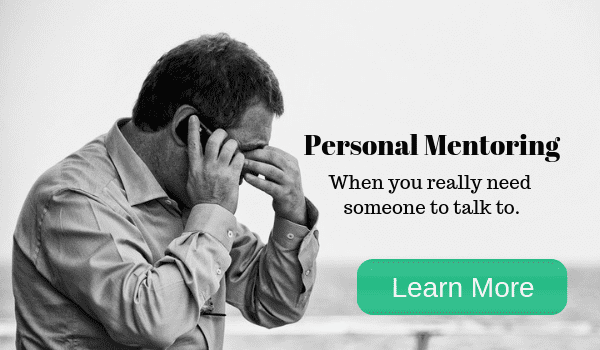This week we want to address ways that those who continue to suffer from their partner’s infidelity – sometimes for years – can move on.

By Doug
In a recent discussion for the Affair Recovery Movement, psychotherapist David Feder, MSW, RSW, CSAT, EMDR (Levels 1 & 2) provided us with two groups that folks fall into after experiencing their partner’s infidelity:
- Survivors
- Long-Term Affected
For this post, we’re going review what someone who is long-term affected can do to transition into the survivor’s group and take control of their life.
Characteristics of Long-Term Affected
To start, it might be helpful to review what someone in the long-term affected group might experience.
David says people in the affected-long-term group tend to have a lower self-esteem and feel unworthy. As a result, they may find that they devalue themselves and feel that they’re lesser than, or not deserving of having better.
“People in this group also often don’t feel good about themselves, which makes it harder to advocate well for themselves. As a result, what I find is that people in the group may settle for promises that are made by their spouse or partner, but they’re not kept, which is particularly troublesome and can even be more traumatizing to the person even after finding out about the affair.
“In addition, people in this group worry about how their spouse or partner may react to concerns they might have. So, often they may find themselves keeping their concerns to themselves instead of expressing them openly and clearly. Because of low self-esteem, people in this group may find it hard or harder to establish healthy boundaries and establish consequences that they can follow through with. Boundary-setting and setting consequences are difficult at the best of times, but even more so for people who, as I said, struggle with lower self-esteem. This is often an area of difficulty for people in the affected-long-term group.
Finally, people in this group often feel grateful that their spouse or partner made the decision not to leave the committed relationship instead of running off with the affair partner. Because of that, and because they feel grateful, they may be more hesitant not to express themselves, not to say what they have on their mind, and not to advocate for themselves. Often this results in their needs not being addressed and not being met.
So, considering the question of how someone in the long-term-affected group can move into the survivors group, it’s clear, in my opinion, that the person should strongly, and as quickly as possible, get themselves into individual counseling or coaching or something outside of trying to work on this by themselves. People in the long-term-affected group benefit from feeling better about themselves.”
Areas of Focus after Your Partner’s Infidelity
To help that along, therapy or coaching should focus on the following areas:
- Improving self esteem is critical
- Processing the trauma of finding out that the person you thought was committed to you had an affair
- Helping the hurt partner to establish healthy boundaries and appropriate consequences that they can follow through with
- Addressing codependent issues that leaves them in a place where they put the needs, wants, and desires of their spouse or partner ahead of their own needs, wants, and desires.
For people who may not be familiar with the term “codependent,” it might be helpful to define what that means.
If you look at the literature available, anyone reviewing the term “codependence” is going to find that codependency is defined in many different ways. One definition that we found to be very helpful is the definition by Melody Beattie, who, in her book, Codependent No More, suggests that, “A codependent person is one who has let another person’s behavior affect him or her and who is obsessed with controlling that person’s behavior.”
She continues to say, “Recovery lies not in the other person, no matter how much we believe it does. It lies in ourselves in the ways we have let other people’s behaviors affect us and in ways we try to affect them: the obsessing, the controlling, the obsessive helping, caretaking, low self-worth bordering on self-hatred, self-expression, abundance of anger and guilt, dependency on other people, attraction to and tolerance for the bizarre, other-centeredness that results in abandonment of self, communication problems, intimacy problems, and an ongoing whirlwind trip through the five-stage grief process.”
So, thinking about that definition, we could see that it encompasses an awful lot and captures so much of what is present in unhealthy relationships.
That’s not to say that every point has to be checked off in every relationship in order for it to be co-dependent, but if a person thinks about codependent relationships and goes over some of those points, I would imagine that you’ll see that many of them are present, especially when thinking about the caretaking or being particularly focused on how the person is going to react to the other person’s feelings – and really abandoning ourselves and what we need and what we feel and making sure that our needs are being expressed.
David states that, “If I’m concerned about your feelings and I’m concerned about how you may react if I express how I feel about something you’re doing, and I’m worried you’re going to be upset or I’m worried you’re going to leave the relationship and you’re never going to talk to me again, I’m going to keep my needs to myself. I find that to be particularly present in so many relationships of people who I work with.”
You could imagine how particularly difficult it is to express your needs when you partner just had an affair because you’re already feeling “one down” and you’re already feeling not important and replaced by the affair partner. Many people are just grateful that the unfaithful spouse didn’t leave the committed relationship. This creates a real problem for people who are codependent and worried about how their spouse is going to react.
David cautions, “I want to say one point about people who are codependent or fall into that category. I feel for anybody in that position because people who are codependent have often been criticized, judged, and put down by other people. What they need to help them move out of that place is less harshness in their lives.
For that reason alone, they should be extremely careful in who they choose for their therapist or coach and who they allow into their circle of support because the last thing that people who are having those kinds of problems in their relationships need is someone who’s going to criticize them or shame them or make them feel worse than they already feel.
So just a word of caution to be really careful that, when you’re reaching out to a therapist, when you’re reaching out to a coach, to be critical with who they are and make sure that they’re a good fit for you and that they really understand codependency.
Individual therapy should focus on helping the person who may be codependent determine the part that they play in their own victimization in the relationship with the participating partner. Quite often, it might be the same role they play in other relationships, whether it be the same relationship before the affair, after the affair or other relationships that they may have in general with other people.
David continues, “I want to make sure that no one gets the impression that I’m saying that the hurt partner is responsible for their spouse having an affair, because they’re not. This is more defining the different roles that we play. Certainly, recognizing their own part in the relationship will free them to establish better boundaries and consequences and not leave them in a place where they put up with being treated inappropriately or unfairly.”
Morley Safer of 60 minutes fame had an interesting perspective on codependency. He said, “Ever since people first existed, they have been doing all the things we label codependent. They have worried themselves sick about other people. They have tried to help in ways that didn’t help. They have said yes when they meant no. They have tried to make other people see things their way. They have bent over backwards to avoid hurting people’s feelings and, in so doing, have hurt themselves. They have been afraid to trust their feelings. They have believed lies and then felt betrayed. They have wanted to get even and punish others. They have struggled for their rights while other people said they didn’t have any. They have worn sackcloth because they didn’t believe they deserved silk.”

Accept These 3 Pillars as Your Truth
Before a person can even think about moving from the long-term affected group to a survivor, they really need to accept the following 3 Pillars as their truth:
- “I am responsible for what I feel at this and every moment.”
- “I am responsible for my happiness and wellbeing.”
- “I can make the choice to be happy, regardless of my partner’s actions and deeds.”
7 Areas of Focus for Moving from Long-Term Affected to Survivor
From there, once they have those three pillars under their belt, so to speak, individual counseling should focus on the following seven areas.
1. Dealing with the trauma of the betrayal. This is important and cannot be overlooked, but often is overlooked in recovery for the hurt partner. Treatment is focused on two parts: education about the trauma and processing the feelings associated with the trauma.
The most common emotions associated with relational trauma (for anybody who has been through it, some of these you are going to relate to) include self-blame, which is where the hurt partner blames themselves for the infidelity, which obviously is not true, but that’s often what happens.
The second one is confusion. That’s where the hurt partner is confused about what happened, so they seek the truth of what really happened.
The third is fear and hypervigilance, which is brought about by the hurt partner’s fear of being hurt again. The next one is a lack of social support, which is where the hurt partner doesn’t have enough support because they fear being judged. When the hurt partner has support, the trauma loses its power, and the hurt partner can begin to heal. So, support is very important.
Next, there’s grief due to the consequences of the betrayal and subsequent losses, including such things as the life the hurt partner thought he or she had, the partner he or she thought they had, and/or loss of friendships, loss of income, not seeing the kids, or not being with the kids seven days a week, if there’s a separation.
The next one is emotional instability, which is experienced when the hurt partner has difficulty functioning in his or her daily life due to anxiety, depression, poor concentration, preoccupation or obsession with what happened, crying and/or a lack of motivation, just to name a few of the common ways emotional instability gets expressed.
There’s anger at the unfaithful partner, which is fairly common and self-explanatory.
Avoidance and distraction are seen when the hurt partner just wants life to return to normal. So basically, they throw themselves back into their typical daily routine, focusing on such things as parenting and work. It’s not completely abnormal not to want to think about problems 24/7, but what may work best is a combination of these two, where you talk about it some of the time, and some of the time you have a normal routine, or as normal a routine as you can. It isn’t healthy when all a person thinks about is how they were betrayed.
Finally, there’s ambivalence and withdrawal, which occurs when the hurt partner is not sure how they respond to the betrayal. The hurt partner doesn’t want to get hurt again, but he or she isn’t sure what to do about the committed relationship. Should they leave? Should they stay and work through the issues and rebuild? It’s hard to know, especially at the beginning.
Another example of when withdrawal may occur is when either spouse feels hopeless about a future together. So, because of the feeling of hopelessness, one spouse may withdraw from the other spouse.
All of this falls under dealing with the trauma of the betrayal because all of those points are examples of the most common emotions associated with relational trauma – which is clearly what infidelity is.
2. Feeling stronger and more sure of yourself. This is critical in the hurt partner’s recovery, as so much of what comes afterwards builds on the hurt partner having a healthier and more vibrant feeling of self.
3. Valuing yourself. Once the hurt partner has done the work to improve their self-esteem and starts to feel better about themselves, they are then able to start to see their value as a human being and begin to accept that they deserve to be treated well and better than they had been.
4. Step back and stop trying to change your partner. This is where the hurt partner’s acceptance of the three pillars (that were talked about above) really starts to bear fruit, because now the hurt partner begins to work towards giving themselves permission to be happy regardless of what the unfaithful partner does or doesn’t do.
Previously, it all depended on what the unfaithful partner did or didn’t do. They had that right. “It doesn’t have to define me, and it doesn’t have to affect whether I can be happy or not, or move on with my life or not.”
5. Trusting your feelings. Here the hurt partner moves from a place of confidence, trusting their feelings, needs, and wants, and advocating towards ensuring that they get what they need, and realize they don’t have to settle for anything less. If they’re not going to get what they need, they start seeing that maybe this isn’t where they want to be or where they should be because they are now valuing themselves.
6. Establish healthy boundaries and appropriate consequences. Eventually, by doing this work, the hurt partner starts to become more cognizant that being happy is actually their birthright. Now the hurt partner, with a renewed and healthier self-esteem, finds that establishing those healthy boundaries and appropriate consequences seems a little bit easier because they feel they have a right to do so. And they can see that establishing boundaries is part of having a healthy relationship.
7. Act. Take action towards making the future happen now. This step is the culmination of the first six steps of treatment. When the hurt partner reaches this point, we see a transformed person who’s able to move into the survivor’s group.
In Summary
One of the mistakes hurt partners make that gets them stuck and keeps them stuck is that their dominant focus is on the unfaithful partner. They make a huge mistake of believing that their recovery depends on what the unfaithful partner either does or doesn’t do.
Hopefully this article has been successful in making the point for all hurt partners who find themselves stuck in pain and personal suffering, that the key to their own happiness lies largely in their own hands.
What people need to do is familiarize themselves with – and hopefully accept – the three pillars that David provided, overcome obstacles that prevent them from embracing those three pillars, and then get into coaching or individual therapy where they take responsibility for what happens in their life and their relationship for the future.
Everything in this article should provide some hope that it can be done. It’s not easy by any stretch of the imagination, but it can be achieved. It’s your willingness and commitment and effort that’s the important thing.
This allows for hope for people to either be happy in the new relationship that’s going to be formed with the unfaithful partner, if that’s the eventual outcome, or happier in their own life.
David ends by saying, “Where I feel relationships fail more often is where there’s a dependency on one spouse to provide for the happiness of the other spouse and, in this case, the hurt partner not doing their own work.”
“So, I think it’s critically important not to get into a position or not to stay in the position of ‘I’ve been victimized by my spouse’s affair, and they have to make it right for me.’ I think it’s more appropriate and helpful to say, ‘I have to take responsibility for my own happiness. If my spouse is not going to play ball with me, if they’re not going to go down that path with me…because I’m responsible for my own happiness, I can still make that happen.’
It’s not easy, but neither is it easy staying in a codependent relationship that’s not going to change.”


1 Response to "Transitioning to a Survivor After Your Partner’s Infidelity"
My husband cheated on me n i just gave birth to his child